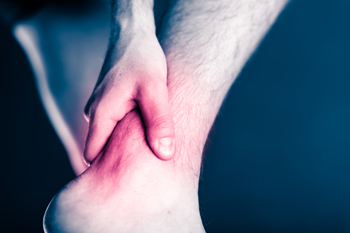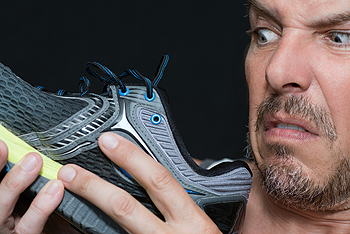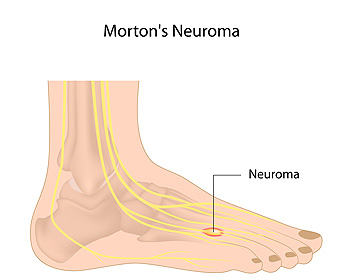Blog
It's Time for Beautiful Feet.
Causes of Achilles Tendon Injuries
 People who experience Achilles tendon injuries are typically involved in jumping and running activities. Additionally, this type of injury may occur as a result of suddenly tripping or falling from an extreme height. The function of the Achilles tendon is to connect the calf muscles to the heel area. If this should become torn, there typically are noticeable signs that an Achilles tendon rupture has occurred. These may include hearing a loud and popping noise, followed by severe pain and discomfort. A confirmation is typically needed to determine if an Achilles tendon injury has occurred, and this may be accomplished by having and MRI or ultrasound performed. If you have endured this type of injury, it is suggested that you seek the advice of a podiatrist who can determine what the best course of treatment is for you.
People who experience Achilles tendon injuries are typically involved in jumping and running activities. Additionally, this type of injury may occur as a result of suddenly tripping or falling from an extreme height. The function of the Achilles tendon is to connect the calf muscles to the heel area. If this should become torn, there typically are noticeable signs that an Achilles tendon rupture has occurred. These may include hearing a loud and popping noise, followed by severe pain and discomfort. A confirmation is typically needed to determine if an Achilles tendon injury has occurred, and this may be accomplished by having and MRI or ultrasound performed. If you have endured this type of injury, it is suggested that you seek the advice of a podiatrist who can determine what the best course of treatment is for you.
Achilles tendon injuries need immediate attention to avoid future complications. If you have any concerns, contact Dr. Luz Colon of Absolute Foot & Ankle Specialists Inc.. Our doctor can provide the care you need to keep you pain-free and on your feet.
What Is the Achilles Tendon?
The Achilles tendon is a tendon that connects the lower leg muscles and calf to the heel of the foot. It is the strongest tendon in the human body and is essential for making movement possible. Because this tendon is such an integral part of the body, any injuries to it can create immense difficulties and should immediately be presented to a doctor.
What Are the symptoms of an Achilles Tendon Injury?
There are various types of injuries that can affect the Achilles tendon. The two most common injuries are Achilles tendinitis and ruptures of the tendon.
Achilles Tendinitis Symptoms
- Inflammation
- Dull to severe pain
- Increased blood flow to the tendon
- Thickening of the tendon
Rupture Symptoms
- Extreme pain and swelling in the foot
- Total immobility
Treatment and Prevention
Achilles tendon injuries are diagnosed by a thorough physical evaluation, which can include an MRI. Treatment involves rest, physical therapy, and in some cases, surgery. However, various preventative measures can be taken to avoid these injuries, such as:
- Thorough stretching of the tendon before and after exercise
- Strengthening exercises like calf raises, squats, leg curls, leg extensions, leg raises, lunges, and leg presses
If you have any questions please feel free to contact our office located in Miami, FL. We offer the newest diagnostic tools and technology to treat your foot and ankle needs.
Read more about What are Achilles Tendon InjuriesHeel Pain Can Be Treated!
Flatter Arches May Be Indicative of Excess Weight Gain
 The feet bear the weight of the body. Uncomfortable and painful foot conditions may develop as a result of excess weight that is carried around. Many patients may find difficulty in maintaining a regular exercise program; this difficulty may be instrumental in gaining additional weight. This may be due to experiencing limited mobility, and losing the excess weight may prove to be challenging. The feet may change sizes, and you may notice the arch appearing flatter, in addition to the feet becoming wider. Some patients are familiar with arthritis that develops in the feet and ankles, which may be a side effect of increased weight gain. A specific type of arthritis that is known as gout may develop on the side of the big toe, which may be a result of ingesting unhealthy and fattening foods. If you have gained weight and are concerned about the health of your feet, it is suggested to speak with a podiatrist who can provide you with proper information.
The feet bear the weight of the body. Uncomfortable and painful foot conditions may develop as a result of excess weight that is carried around. Many patients may find difficulty in maintaining a regular exercise program; this difficulty may be instrumental in gaining additional weight. This may be due to experiencing limited mobility, and losing the excess weight may prove to be challenging. The feet may change sizes, and you may notice the arch appearing flatter, in addition to the feet becoming wider. Some patients are familiar with arthritis that develops in the feet and ankles, which may be a side effect of increased weight gain. A specific type of arthritis that is known as gout may develop on the side of the big toe, which may be a result of ingesting unhealthy and fattening foods. If you have gained weight and are concerned about the health of your feet, it is suggested to speak with a podiatrist who can provide you with proper information.
Obesity has become very problematic at this point in time and can have extremely negative effects on the feet. If you’re an obese individual and are concerned about your feet, contact Dr. Luz Colon from Absolute Foot & Ankle Specialists Inc.. Our doctor can provide the care you need to keep you pain-free and on your feet.
Obesity and Your Feet
Since your feet are what support your entire weight when standing, any additional weight can result in pain and swelling. Being overweight is one of the main contributors to foot complications.
Problems & Complications
Extra Weight – Even putting on just a few extra pounds could create serious complications for your feet. As your weight increases, your balance and body will shift, creating new stresses on your feet. This uneven weight distribution can cause pain, even while doing the simplest tasks, such as walking.
Diabetes – People who are overweight are at serious risk of developing type-2 diabetes, which has a drastic impact on the health of your feet. As you get older, your diabetes might worsen, which could lead to loss of feeling in your feet, sores, and bruises. You could also become more prone to various infections.
Plantar fasciitis – Pressure and stress that is placed on muscles, joints, and tendons can trigger plantar fasciitis, which is an inflammation of tissue that forms along the bottom of the foot.
If you have any questions please feel free to contact our office located in Miami, FL. We offer the newest diagnostic and treatment technologies for all your foot and ankle needs.
Read more about How Obesity Affects Your FeetPlantar Hyperhidrosis May Cause Discomfort
 If you suffer from plantar hyperhidrosis, you are among one to three percent of the population that is affected by this condition. This is an ailment in which the feet produce an excessive amount of sweat and may make the patient feel uncomfortable and embarrassed. It may cause limitations in performing daily activities and may lead to the development of bacterial and fungal infections. People who are afflicted with this condition may find relief in wearing cotton socks, which may aid in absorbing the excess sweat. Some people may benefit by using powder in their socks, in addition to wearing inner soles, which may help in protecting the shoes. If you think you may have plantar hyperhidrosis, it is suggested to speak with a podiatrist, so the proper treatment techniques can be discussed and started.
If you suffer from plantar hyperhidrosis, you are among one to three percent of the population that is affected by this condition. This is an ailment in which the feet produce an excessive amount of sweat and may make the patient feel uncomfortable and embarrassed. It may cause limitations in performing daily activities and may lead to the development of bacterial and fungal infections. People who are afflicted with this condition may find relief in wearing cotton socks, which may aid in absorbing the excess sweat. Some people may benefit by using powder in their socks, in addition to wearing inner soles, which may help in protecting the shoes. If you think you may have plantar hyperhidrosis, it is suggested to speak with a podiatrist, so the proper treatment techniques can be discussed and started.
If you are suffering from hyperhidrosis contact Dr. Luz Colon of Absolute Foot & Ankle Specialists Inc.. Our doctor can provide the care you need to attend to all of your foot and ankle needs.
Hyperhidrosis of the Feet
Hyperhidrosis is a rare disorder that can cause people to have excessive sweating of their feet. This can usually occur all on its own without rigorous activity involved. People who suffer from hyperhidrosis may also experience sweaty palms.
Although it is said that sweating is a healthy process meant to cool down the body temperature and to maintain a proper internal temperature, hyperhidrosis may prove to be a huge hindrance on a person’s everyday life.
Plantar hyperhidrosis is considered to be the main form of hyperhidrosis. Secondary hyperhidrosis can refer to sweating that occurs in areas other than the feet or hands and armpits. Often this may be a sign of it being related to another medical condition such as menopause, hyperthyroidism and even Parkinson’s disease.
In order to alleviate this condition, it is important to see your doctor so that they may prescribe the necessary medications so that you can begin to live a normal life again. If this is left untreated, it is said that it will persist throughout an individual’s life.
A last resort approach would be surgery, but it is best to speak with your doctor to find out what may be the best treatment for you.
If you have any questions please feel free to contact our office located in Miami, FL. We offer the newest diagnostic and treatment technologies for all your foot and ankle needs.
Read more about Hyperhidrosis of the FeetReminder: When was the last time...?
Where Is Pain from Morton’s Neuroma Located?
 If you are experiencing pain in the toe area of your foot, you may have a condition that is referred to as Morton’s neuroma. It may generally develop as a result of the nerves, that provide sensation between the toes, becoming compressed. Typical symptoms that may develop from this ailment may be intense pain or a burning feeling and may often be noticed on the bottom of the foot that extends to the toe area, which may cause walking to become difficult. Research has shown that it may develop by wearing improper footwear, which may include specific styles of high heels. Additional reasons why Morton’s neuroma may happen may be a result of an injury that occurs to the nerves in the surrounding area, or foot conditions, which may include bunions, hammertoes, or abnormal arches. If you have pain that involves your toes, it is suggested to consult with a podiatrist to learn about correct treatment techniques for Morton’s neuroma.
If you are experiencing pain in the toe area of your foot, you may have a condition that is referred to as Morton’s neuroma. It may generally develop as a result of the nerves, that provide sensation between the toes, becoming compressed. Typical symptoms that may develop from this ailment may be intense pain or a burning feeling and may often be noticed on the bottom of the foot that extends to the toe area, which may cause walking to become difficult. Research has shown that it may develop by wearing improper footwear, which may include specific styles of high heels. Additional reasons why Morton’s neuroma may happen may be a result of an injury that occurs to the nerves in the surrounding area, or foot conditions, which may include bunions, hammertoes, or abnormal arches. If you have pain that involves your toes, it is suggested to consult with a podiatrist to learn about correct treatment techniques for Morton’s neuroma.
Morton’s neuroma is a very uncomfortable condition to live with. If you think you have Morton’s neuroma, contact Dr. Luz Colon of Absolute Foot & Ankle Specialists Inc.. Our doctor will attend to all of your foot and ankle needs and answer any of your related questions.
Morton’s Neuroma
Morton's neuroma is a painful foot condition that commonly affects the areas between the second and third or third and fourth toe, although other areas of the foot are also susceptible. Morton’s neuroma is caused by an inflamed nerve in the foot that is being squeezed and aggravated by surrounding bones.
What Increases the Chances of Having Morton’s Neuroma?
- Ill-fitting high heels or shoes that add pressure to the toe or foot
- Jogging, running or any sport that involves constant impact to the foot
- Flat feet, bunions, and any other foot deformities
Morton’s neuroma is a very treatable condition. Orthotics and shoe inserts can often be used to alleviate the pain on the forefront of the feet. In more severe cases, corticosteroids can also be prescribed. In order to figure out the best treatment for your neuroma, it’s recommended to seek the care of a podiatrist who can diagnose your condition and provide different treatment options.
If you have any questions, please feel free to contact our office located in Miami, FL. We offer the newest diagnostic and treatment technologies for all your foot care needs.
Read more about Morton's Neuroma








